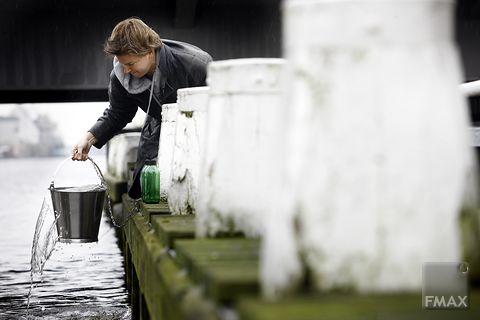With a bus full of self-built, McGyver-like equipment for giving demonstrations, Delft hydrologists have departed for Vienna. On the way back they’ll sample the Rhine.
There is barely room left to sit in Rolf Hut’s office at the faculty of Civil Engineering and Geosciences. Hut (MSc), an experimentally orientated hydrologist, points out the various instruments and explains what they’re used for – a wave basin to demonstrate Microsoft Kinect’s applicability as a wave detection device; a wooden windtunnel with a temperature sensor immune to direct radiation; and a perforated rain-pipe that functions like a large-surface rain meter. The more rain that has fallen, the higher the water sprays out of the sides of the perforated pipe.
Home-built equipment is a bit of a Delft passion, Hut admits, with a preference for using devices that were never meant to be used in such a way, like the 0.20 cent microphone that detects rain by recording the sound of it. “Unintended use of measure equipment,” he calls it, and this is also the title of the lecture and demonstration he and his colleagues from hydrology and water resources management will present at the annual assembly of the European Geophysical Union this week in Vienna. Hut hopes that their ‘McGyver style’ equipment, featuring lots of tie wraps and duct tape will catch on among other groups as well.
A perforated rain-pipe for example may sound cranky, but it makes good sense to measure rainfall over an extended area. “Instrument makers understandably strive to make their products as precise as possible,” he says, “but the quantity of rain varies strongly from one place to the next. We prefer to measure with lower precision over a larger area.”
On the return journey from Vienna Hut and a colleague will take samples of Rhine river water every 20 kilometres or so. With a stainless steel bucket they’ll be sampling for remnants of medicines. They expect the load of anti-depressive and ibuprofen to increase with every major city they pass. In fact, they want to test drug remnants as an indicator of human civilisation along the banks.
De muziek van het vijftal To be frank (voorheen ‘Is’) zit ergens tussen folk, pop en lekkere rock in, volgens bassist Maarten Stok. Ideale muziek om bij in de hangmat te liggen, zegt Erik Wolsky, die zijn trompet- en bugelspel mooi door de nummers heen probeert te weven. Inspiratiebronnen? “Heel veel”, zegt Stok. Hij noemt John Mayer, maar ook Stikker, een Nederlandstalige cultband uit de onbekende-festivals-scene.
De bandleden, die elkaar kennen van Virgiel, begonnen in 2009 samen nummers te schrijven. Hoe dat gaat? Stok: “Iemand brengt een muzikaal lijntje in of een melodie. Daar gaan we dan met zijn allen mee worstelen, totdat er een geheel ontstaat. Daarvan wordt trouwens heel wat weggegooid.”
Hoogtepunten waren optredens op het IO-festival en Studuction 2009 en het winnen van de singer/songwriterwedstrijd op het cultuurcentrum. Van de studentenfeesten willen ze een beetje af. Stok: “In kroegen en zaaltjes en op festivals wordt beter naar je geluisterd. De schoonheid van de muziek staat centraal, niet het op zijn kop zetten van de zaal. Wij willen mooie liedjes brengen.” Op 8 juni wordt in Speakers de debuut-EP ‘To be frank’ gepresenteerd, met vijf eigen composities. Opgenomen in de oefenruimte, op Valentijnsdag: “Je kunt horen dat hij met liefde gemaakt is”, zegt drummer Bart-Jan van der Spek. Opmerkelijk: de groep ontstond aan de Spoorsingel 61. Hetzelfde studentenhuis waar veertig jaar geleden enkele bewoners de band Alquin oprichtten. Stok: “Onze droom is om in navolging van Alquin ooit op Pinkpop te staan.”
Eén voorbehoud heeft het door zanger Jochem de Jong gecompleteerde gezelschap wel: gitarist Michiel van Sinderen speelt niet als er geen bounty’s klaarliggen in de kleedkamer. Goed soleren zonder bounty’s lukt niet. Wolsky: “Lastig, want hij wil per se rode bounty’s en die zijn minder courant.”
In deze nieuwe rubriek onderzoekt Jimmy Tigges of er nog goede muziek gemaakt wordt op en rond de TU Delft.



Comments are closed.